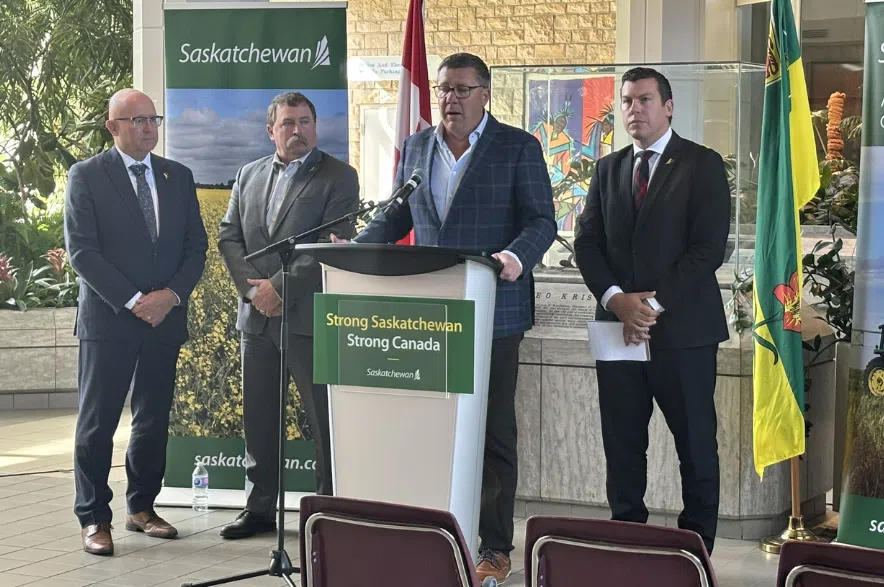Today, Premier Scott Moe met with provincial canola stakeholders and agriculture ministers to address the recent tariffs imposed by China on provincial canola exports in Saskatoon. They called on the federal government to take “quick, meaningful action” to resolve the current situation.
Moe met with Trade and Export Development Minister Warren Kaeding, Agriculture Minister Daryl Harrison, Federal Minister of Agriculture and Agri-Food Heath MacDonald and Parliamentary Secretary to the Prime Minister Kody Blois, at the University of Saskatchewan’s College of Agriculture building.
Read more:
- Premier Scott Moe announces road upgrade to support Sask. canola crush facility
- Saskatchewan Premier Moe, federal minister to meet on China canola tariff
- Farmers call govt to take action against Chinese canola tariffs
“The Government of Saskatchewan condemns China’s punitive tariffs on canola, which directly impact Saskatchewan families,” Moe said in a news release. “This is an urgent situation for Saskatchewan producers and we must work together to find immediate solutions.”
Earlier this month, the Chinese government imposed a 76 per cent tariff on Canadian canola exports—on top of existing tariffs on canola oil and meal. These measures are widely seen as retaliatory, following Canada’s decision to place tariffs on Chinese electric vehicles.
“Saskatchewan is one of the largest canola producers in the world, supporting thousands of jobs and driving economic growth across Canada,” Moe added. “As a province that exports nearly 70 per cent of everything we produce, we will continue to champion free and fair global trade.
Moe determined to negotiate in China
Premier Scott Moe is determined to travel to China to talk canola tariffs, and he’s hoping that a federal delegation will come along as well.
The premier also said he would be travelling to China, and he’s planning on “opening discussions” with the federal government to join him.
“To join and go together, and we would be there in support of the federal government, negotiating an end to the canola tariffs that we have,” he said.
At this point, though, there’s no commitment from either Prime Minister Mark Carney, Heath MacDonald, the federal agriculture minister, something that Moe said is vital to actually negotiating a potential new deal between China and Canada.
“It isn’t going to be Premier Moe and President Xi (Jinping) that stand up and say ‘we’ve come to a trade deal here and everything is good moving forward.’ It is going to be Prime Minister Mark Carney and President Xi (Jinping) that ultimately are going to speak on behalf of their countries,” said Moe during the news conference.
The province has had a trade office in China for the last eight years, and Moe talked about fostering and advancing relationships with Xi Jinping, China’s president.
“Saskatchewan is the obvious advocate, and the obvious province to support the federal government in starting these discussions on how we can have a more free and open access to the Chinese market for the canola products, yes, but also peas, as well as seafood and pork,” Moe said.
“It needs to start somewhere, and we’re suggesting it starts on the ground in China with our federal government, and we’re there to support them every step of the way.”
Sask Oilseeds Chair weighs in on China trip
Dean Roberts, Chair of Sask Oilseeds, said he was happy to have a seat at the meeting table today, and to finally get some engagement at a level that feels “appropriate.”
“This announcement is fairly fresh, but coming into harvest, it’s urgent for farmers. We need action, and we need it now while these duties are still preliminary,” he said.
Roberts said action meant engagement between the federal government and China at the highest levels.
“Anytime trade comes up, it’s a very complicated issue… there’s a lot of factors to consider,” he added.
At this point, he has not been invited to be part of the delegation to China, but his group will continue to engage with and share their perspective with the provincial government.
“Farmers are being used as a pawn in the current geopolitical environment. Unprecedented market closure amidst an already stressful time of year has a compounding adverse effect on farmers,” he said.
“Today’s dialogue with government leaders centred on practical solutions that could be activated to support farmers’ livelihood in the short-term.”











